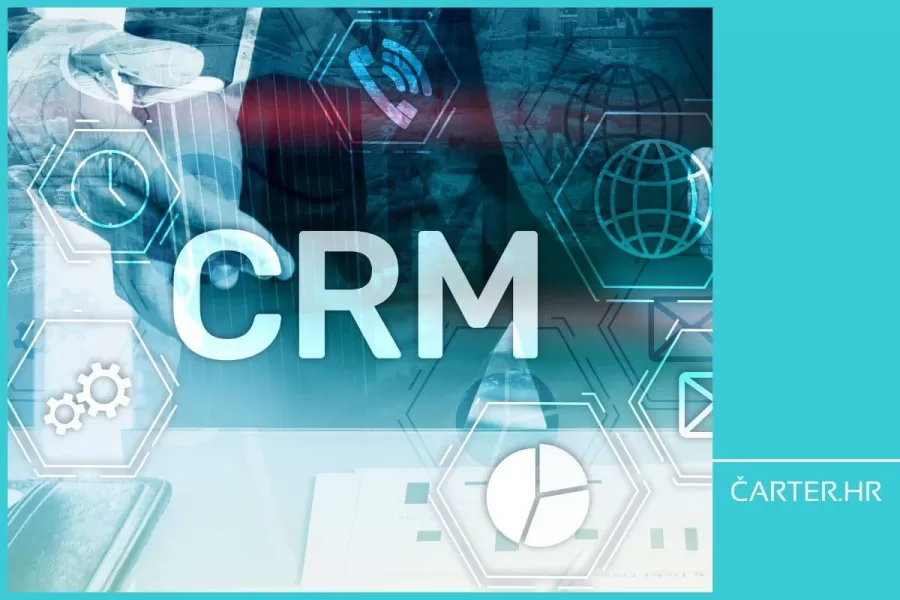
CRM tools are fundamental to digital transformation and the strategies you want to focus on your customers. They enable companies to improve business performance and create a competitive advantage. In her new article, Andreja Fazlić reveals how CRM systems optimise the personalisation of the user experience and stimulate revenue growth.
When we talk about digital transformation and integrating a user-centric strategy into business, CRM (Customer Relationship Management) tools play an essential role in the context of technology. And I believe that you already know that technology is one of the 6 indispensable elements of the revenue flywheel.
In the previous column, I wrote about the challenges that companies face when trying to optimise their business. This time, I focus on a tool that is often crucial to the success of such projects.
What is digital transformation?
Digital transformation represents a fundamental shift in how companies use technology, processes and human resources to improve business performance, create value and achieve competitive advantage.
It is a holistic process that goes beyond merely adopting new technologies, including changing organisational culture, redefining customer relationships and creating new business models.
At the heart of this transformation is a customer-centric approach, putting their needs and desires at the centre of all initiatives.

What is a user-centric business?
User-centric business approach is designed to recognise and satisfy the needs and desires of users through all points of interaction with the company.
This approach requires a detailed understanding of user preferences, behaviours and expectations, as well as tailoring products, services and experiences to best meet these needs.
At the heart of the user-centric strategy is the belief that by creating value (instead of focusing exclusively on sales), companies not only increase the level of satisfaction and loyalty of their users but also stimulate growth and competitiveness in the market.
What is CRM?
CRM, or customer relationship management, is a technology strategy and tool that enables companies to analyse and manage all interactions and relationships with existing and potential customers throughout their journey. It aims to improve business relationships to increase loyalty and drive revenue growth.
In the yacht charter industry context, CRM can be compared to an advanced navigation system on a yacht.
Instead of relying on outdated maps and compasses (Excel spreadsheets and manual records), CRM provides a digital map of the customer journey, from the first inquiry to post-sales service, enabling personalised communication and services.
Although the basic principles of this tool are consistent across the different brands available on the market, it is important to note that each has its own specifics and terminology that must be adopted for the successful implementation of the tool and implementation of the transformation.
Basic concepts of CRM - objects and properties:
- Contact represents individual people within CRM; as a rule, one email address = one contact. You can have different types of contacts in your CRM, such as: customers, potential customers, business partners, etc. Each contact has its own "properties" or characteristics, such as name, email address, last purchase, etc.
- Deal is a potential or closed sale with a contact or company. Deal properties can include different stages of the sale (depending on what your sales process is like), value, commission, close date, the reason why the sale was not successfully closed, and other relevant information.
- Company is the entity with which you do business. Company properties can include industry, size, revenue, and other important information.
- Ticket is used in the context of customer support to track queries or issues that your contacts have.
CRM systems also offer tools that optimise processes: marketing automation enables personalised communication with contacts, sales funnel management efficiently leads sales opportunities and optimises sales team resources, while analytics and reporting provide key insights for strategic decision-making.
HubSpot additionally highlights tools such as integrations with social networks and CPC ad channels to improve online presence, SEO tools for content optimisation, and chatbots for automated communication, making it a powerful solution for comprehensive customer relationship management.
How does it look in practice?
CRM tools significantly improve how companies manage sales, marketing and customer support.
In the practice of the charter industry, it can look like this:
- Sales: CRM automates responses to customer inquiries, providing quick information on availability and pricing. Every step, from inquiry to booking, is precisely tracked, which enables teams to manage time more efficiently and increase sales chances.
- Marketing: CRM uses customer data to create personalised marketing campaigns. For example, clients interested in a specific type of yacht can receive customised offers, leading to greater engagement and better sales results.
- Customer support: CRM provides fast and accurate support, responding to customer inquiries and requests. This increases satisfaction and strengthens brand loyalty.
In addition, it enables a detailed understanding of each contact in the database, from basic information to interaction history, which can make it easier for you to provide personalised service.

CRM is a necessary tool for user-centric business!
These systems are the heart of user-centric strategies. They serve as a centralised platform that collects, analyses and uses contact data to optimise sales, marketing strategies and support services, providing a customised experience for each user. Here's how CRM tools optimise user-centric business:
- They provide a single database containing all customer information, enabling teams to deliver a coherent and personalised experience across all channels.
- Advanced segmentation functions allow businesses to target specific groups of users with customised messages, offers and experiences.
- They enable the automation of personalised marketing campaigns, sales messages and customer support.
- They provide detailed insights into the customer journey, from first contact to post-sales activities.
Adapting business to the user and digital transformation are the key to success.
CRM systems, like HubSpot, are a central piece of technology in this strategy, offering tools to personalise the customer experience and stay competitive.
Categories of trends
- News
- Sale
- Marketing
- SEO
- Web design
- Social media
- Technology
- Regulations
- Management
- Education
- Finances
- User experience
Newsletter
Sign up for the newsletter and receive the latest trends and tips straight to your inbox




